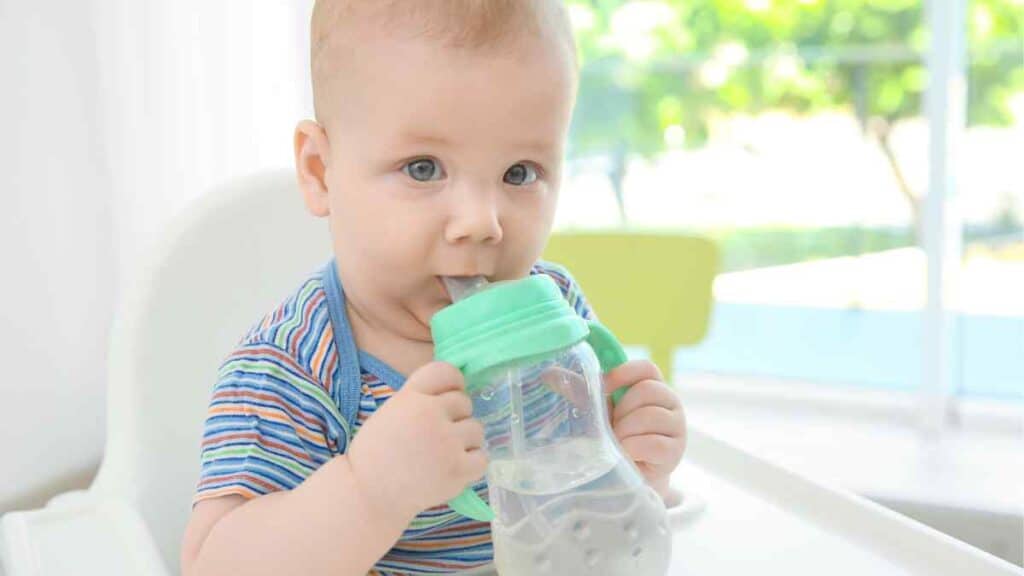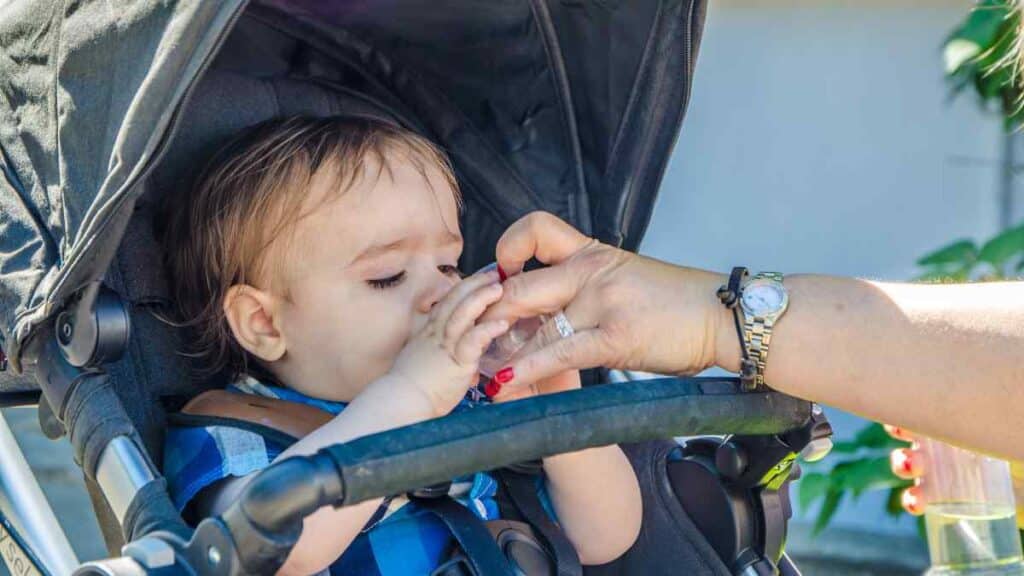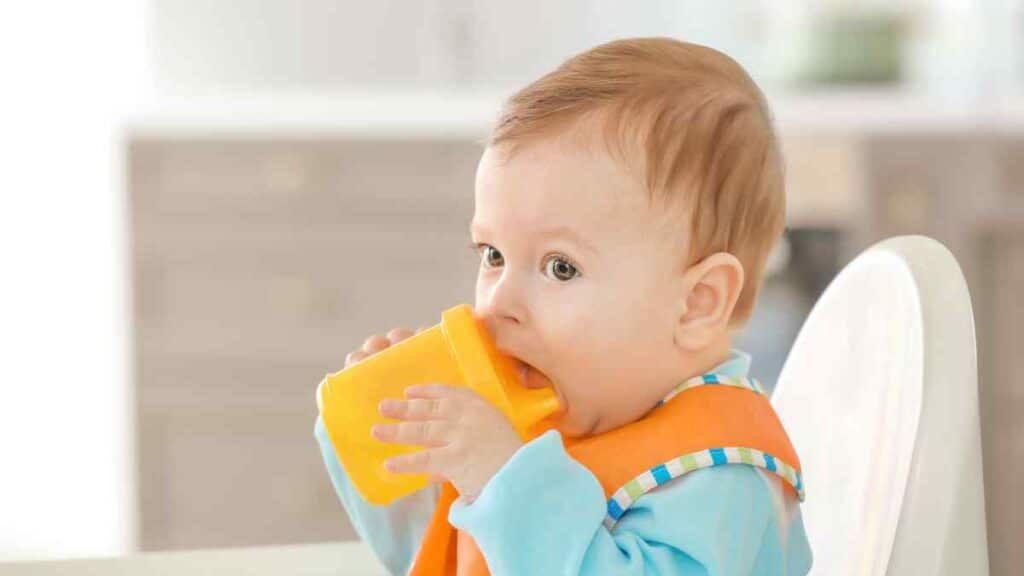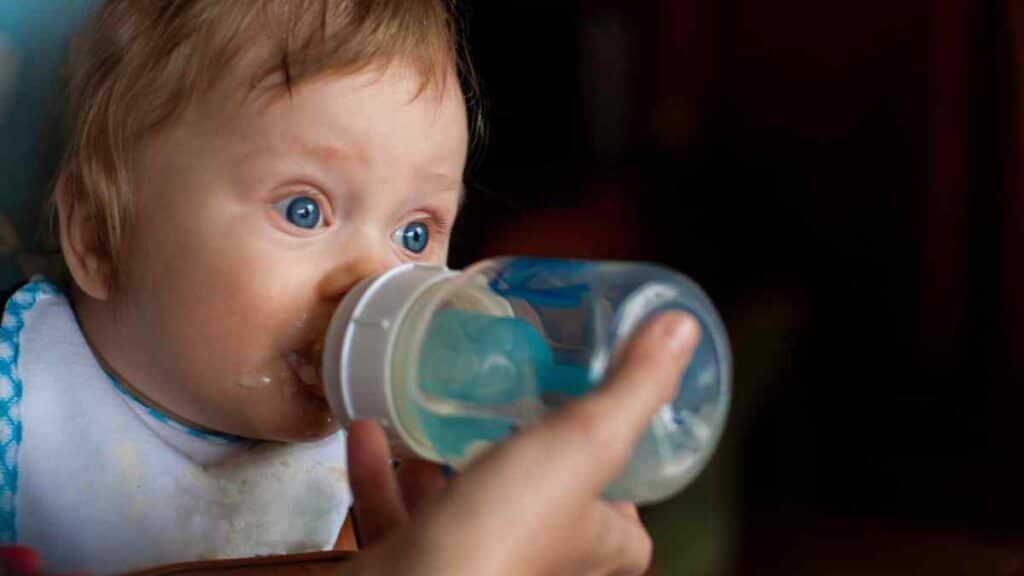Water – it’s a vital element of life, accounting for about 60% of the adult human body. It plays an essential role in numerous body functions, from temperature regulation to waste removal. But when it comes to the youngest among us, the question of when and how to introduce water becomes a subject of intense debate and consideration.
For new parents, it can be overwhelming to navigate through all the do’s and don’ts concerning the health and wellbeing of their little ones. One common question that many parents grapple with is whether or not they can give their babies water. If you’ve found yourself pondering this question, then you’re in the right place.
This article aims to shed light on the subject, addressing when it’s safe to introduce water to babies, how much they should have, and the potential risks of giving them water too early. We’ll explore the crucial role of breastmilk and formula in providing hydration to babies, and we’ll also help you understand how to recognize the signs of proper hydration and dehydration in your baby. So let’s dive into the waters of this essential topic.

The Role of Water to Young Babies
Water is essential for all life forms, and the human body is no exception. It maintains body temperature, lubricates joints, aids in digestion, and carries nutrients and oxygen to cells. It also helps remove waste from the body and protects sensitive tissues and organs. The role of water cannot be overstated, but when it comes to young babies, the guidelines for water consumption are quite different than for adults and older children.
Can Babies Drink Purified Water?
Purified water undergoes a filtration process that removes impurities, chemicals, and contaminants, making it safe for adult consumption. However, for babies, the answer to whether they can drink purified water isn’t straightforward. The American Academy of Pediatrics advises against giving plain water to babies under 6 months of age. Their bodies are small, and their kidneys aren’t fully developed, which can lead to water intoxication, a condition where too much water dilutes the electrolytes in the baby’s body, leading to seizures and, in severe cases, brain damage. Babies under six months get all the hydration they need from breast milk or formula.
Purified vs. Distilled Water for Baby
When it comes to choosing between purified and distilled water, it’s essential to understand the differences. While both are free from impurities, distilled water goes through a boiling process, which separates water from its contaminants. So, can babies have distilled water? Yes, distilled water is safe for babies, especially for mixing formula. However, remember that plain water (whether purified or distilled) should not be given to babies under six months of age.
Best Water for Baby Formula
When preparing baby formula, the water used is of prime importance. Nursery water, often labeled as baby water, is typically distilled and free from fluoride. Tap water can also be used for formula, but it needs to be boiled first to ensure any potential bacteria are killed. Bottled water, both purified and distilled, is another option, though it can be expensive and not environmentally friendly. Regardless of the type, the water used should meet the safety standards set by your local health department.
Recognizing Proper Hydration
Recognizing if your baby is hydrated involves keeping an eye on the number of wet diapers they have in a day. On hot days, especially, babies might need a little extra water, but breast milk or formula should still be their primary source of hydration. Dry mouth and a sunken soft spot on their head are signs of dehydration that require immediate medical attention.

Guidelines for Introducing Water to Babies
Understanding when and how to introduce water to your baby is crucial as it directly impacts their health and development. The guidelines for introducing water are usually age-specific, reflecting the changing needs of growing babies. Here’s a breakdown of when and how much water to offer at each stage:
Newborns to Six Months
During the first six months, babies should not drink any water. They receive all the nutrients and hydration they need from breast milk or formula. Whether you’re using distilled water or purified water to prepare your baby’s formula, the key is to ensure it’s safe and free from harmful contaminants. It’s important to note that distilled water and purified water are not the same. Purified water has gone through a filtration process, while distilled water has been boiled and re-condensed, making it free of impurities. For babies younger than six months, the American Academy of Pediatrics recommends exclusively breastfeeding or formula feeding.
Six Months to One Year
Around the six-month mark, when solid food is introduced, small amounts of water can be given alongside meals. Start with a few sips from a sippy cup during mealtimes [1]. This helps babies learn how to drink water and develops their cup-drinking skills. At this stage, whether you choose purified, distilled, or tap water (boiled and cooled), it should be fluoride-free to avoid dental fluorosis. Stick to no more than 2-4 ounces of water per day to prevent filling up your baby’s small stomach and displacing hunger for nutrient-rich breast milk or formula.
Over One Year
As your child turns one and their diet includes a wide range of solid foods, you can start giving more water. However, remember that milk (breast milk or cow’s milk) and other nutrient-rich fluids should still make up a significant portion of their fluid intake. The amount of water intake can gradually increase with age and activity level, but a general guideline is up to 8 ounces of water a day.
Choosing the Best Water for Babies
Deciding between purified and distilled water can be challenging. Both are safe, but they undergo different processes. Purified water is filtered to remove chemicals and pathogens, while distilled water is boiled and the steam is collected and condensed, removing impurities. You may choose any, but if using tap water, ensure it’s boiled first to kill any potential bacteria. Always cool boiled water before giving it to your baby.

The Role of Breastmilk and Formula in Hydration
Water is a crucial component of life, and it plays a significant role in maintaining our bodies’ health and functions. However, when it comes to young babies, their primary source of hydration comes from something more nutritionally dense: breastmilk or formula. These not only quench their thirst but also provide essential nutrients vital for their growth and development.
Breastmilk: Nature’s Perfect Baby Drink
Breastmilk is the best source of nutrition for most babies and plays a vital role in their hydration. It is made up of about 90% water, especially the first milk (known as foremilk) that comes at the beginning of each feeding. This high water content satisfies your baby’s thirst, particularly in hot weather.
Breastmilk is a dynamically changing nourishment, adapting to a baby’s growing needs. It changes its nutritional profile as the baby feeds, beginning with a lower-fat, high water content milk, progressing to hindmilk, richer in fat and essential nutrients for growth and energy. So, breastfeeding mothers do not need to give their babies additional water – their breast milk provides all the hydration a baby needs.
Formula: A Hydrating Alternative
When breastfeeding isn’t possible, infant formula serves as a good alternative. Prepared according to the instructions, it offers an appropriate balance of nutrients and hydration for babies. Like breastmilk, formula also contains a high proportion of water. However, it’s crucial never to dilute formula in an attempt to hydrate your baby more. Doing so can lead to water intoxication and nutrient imbalances. Similarly, adding more powder than recommended can strain a baby’s kidneys and cause dehydration.
The process of mixing formula should be exact, following the directions on the packaging. The water used, whether it’s tap water (boiled and cooled) or baby water (purified or distilled), needs to be safe and free from contaminants.
Solid Foods and Hydration
As babies start eating solid foods, usually around six months of age, their hydration needs begin to shift. While breast milk or formula should still be their primary source of hydration, small sips of water can be introduced to complement their diet.

Conclusion
In conclusion, when it comes to quenching your little one’s thirst, the rules aren’t quite as straightforward as they are for adults. For the first six months of life, a baby’s hydration needs are entirely met by breast milk or formula, which not only provides water but also delivers essential nutrients for growth and development. Offering additional water during this period can lead to water intoxication, a potentially dangerous condition due to the dilution of electrolytes in a baby’s body.
When babies reach six months and begin eating solid foods, small amounts of water can start being introduced, usually no more than 2-4 ounces per day. The type of water given, be it purified, distilled, or boiled tap water, should be safe and free from harmful contaminants. However, even as they grow, remember that their primary source of both hydration and nutrition should continue to be breast milk or formula, and then, eventually, a balanced diet of solid foods.
Have you learned something new? If yes, please share your feedback in the comments section below. We’d love to hear from you!



